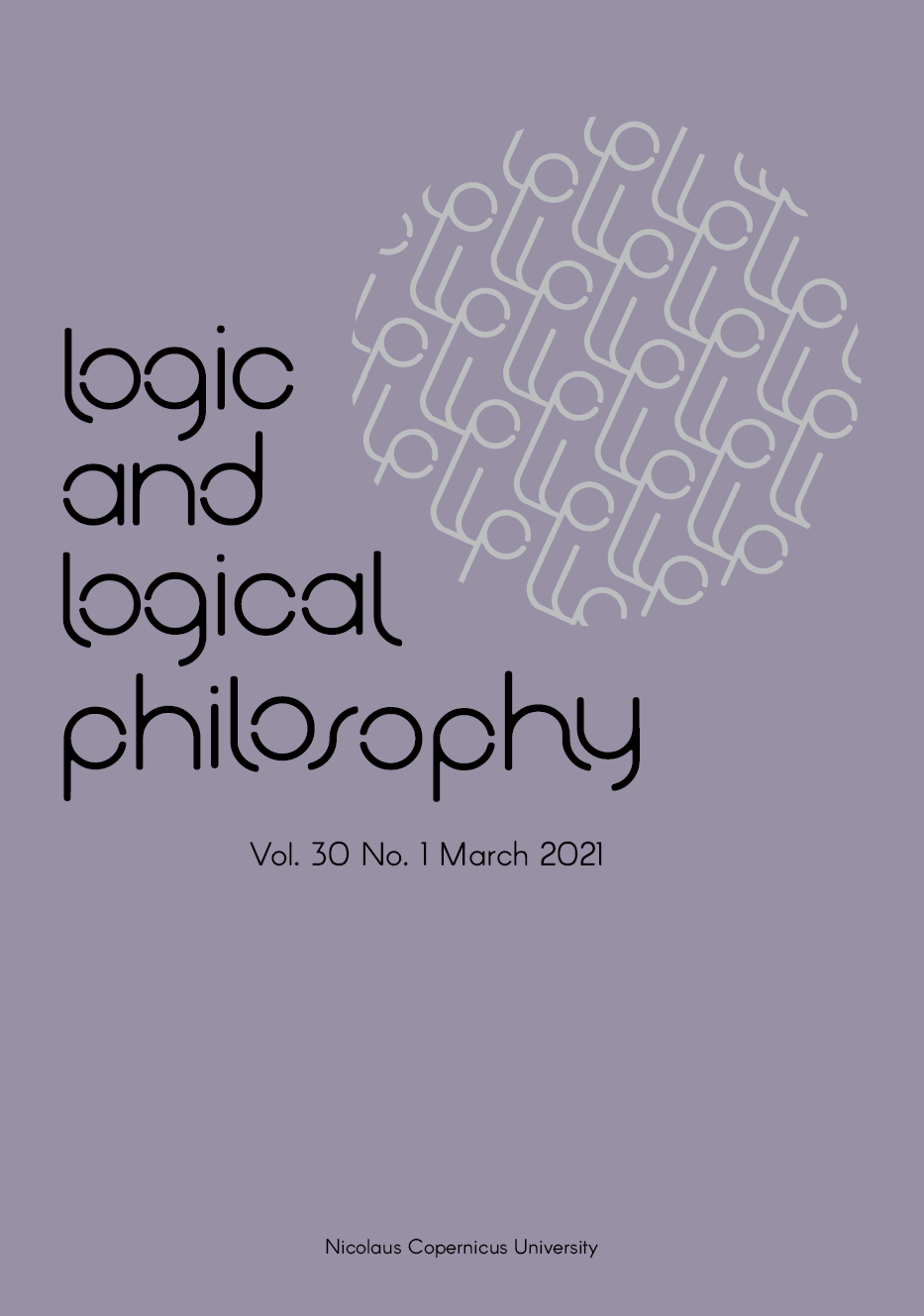A Defeasible Calculus for Zetetic Agents
DOI:
https://doi.org/10.12775/LLP.2020.019Keywords
inquiry, erotetic logic, defeasible reasoning, logical AIAbstract
The study of defeasible reasoning unites epistemologists with those working in AI, in part, because both are interested in epistemic rationality. While it is traditionally thought to govern the formation and (with)holding of beliefs, epistemic rationality may also apply to the interrogative attitudes associated with our core epistemic practice of inquiry, such as wondering, investigating, and curiosity. Since generally intelligent systems should be capable of rational information-seeking behavior, AI researchers have a natural interest in the norms that govern interrogative attitudes. In this paper, we argue that these norms can be modeled via defeasible inferences to and from questions, i.e. erotetic inferences. We offer a sequent calculus that accommodates the unique features of ``erotetic defeat" and that exhibits the computational properties needed to inform the design of inquisitive systems. The calculus presented here is an improved version of the one presented in Millson (2019), extended to cover a new class of defeasible erotetic inferences.The study of defeasible reasoning unites epistemologists with those working in AI, in part, because both are interested in epistemic rationality. While it is traditionally thought to govern the formation and (with)holding of beliefs, epistemic rationality may also apply to the interrogative attitudes associated with our core epistemic practice of inquiry, such as wondering, investigating, and curiosity. Since generally intelligent systems should be capable of rational inquiry, AI researchers have a natural interest in the norms that govern interrogative attitudes. Following its recent coinage, we use the term “zetetic” to refer to the properties and norms associated with the capacity to inquire. In this paper, we argue that zetetic norms can be modeled via defeasible inferences to and from questions – a.k.a erotetic inferences – in a manner similar to the way norms of epistemic rationality are represented by defeasible inference rules. We offer a sequent calculus that accommodates the unique features of “erotetic defeat" and that exhibits the computational properties needed to inform the design of zetetic agents. The calculus presented here is an improved version of the one presented in (Millson, 2019), extended to cover a new class of defeasible erotetic inferences.References
Belnap, ND., and TB. Steel (1976), The Logic of Questions and Answers, New Haven: Yale University Press.
Blöser, C., M. Janvid, H. Matthiessen and M. Willaschek (eds.) (2013), Defeasibility in Philosophy: Knowledge, Agency, Responsibility, and the Law, Rodopi.
Bolotov, A., P. Łupkowski and M. Urbański (2006), “Search and check: Problem solving by problem reduction”, pages 505–510 in Artificial Intelligence and Soft Computing.
Burda, Y., H. Edwards, D. Pathak, A. Storkey, T. Darrell and A.A. Efros (2018), “Large-scale study of curiosity-driven learning”, arXiv preprint arXiv:1808.04355.
Chlebowski, S., M. Komosiński and A. Kups (2017), “Automated generation of erotetic search scenarios: Classification, optimization, and knowledge extraction”, ACM Transactions on Computational Logic 18 (2): 8.
Ciardelli, I., J. Groenendijk and F. Roelofsen (2018), Inquisitive Semantics, Oxford University Press.
Fleisher, W. (2018). “Rational endorsement”. Philosophical Studies 175 (10): 2649–2675. DOI: http://dx.doi.org/10.1007/s11098-017-0976-4
Friedman, J. (2013). “Question–directed attitudes”. Philosophical Perspectives 27 (1): 145–174.
Friedman, J. (2017). “Why suspend judging?”, Noûs 51 (2): 302–326. DOI: http://dx.doi.org/10.1111/nous.12137
Friedman, J. (2019), “Inquiry and belief”, Noûs 53 (2): 296–315. DOI: http://dx.doi.org/10.1111/nous.12222
Friedman, J. (in press). “The epistemic and the zetetic”, The Philosophical Review.
Graziano, V., T. Glasmachers, T. Schaul, L. Pape, G. Cuccu, J. Leitner and J. Schmidhuber (2011). “Artificial curiosity for autonomous space exploration”, Acta Futura 4: 41–51.
Groenendijk, J., and M. Stokhof (1996), “Questions”, pages 1055–1124 in J. van Benthem and A. Ter Meulen (eds.), Handbook of Logic and Language, Elsevier.
Hamblin, C. L. (1958), “Questions”, Australasian Journal of Philosophy 36 (3): 159-168.
Hintikka, J. (2007), Socratic Epistemology: Explorations of Knowledge-Seeking by Questioning, Cambridge University Press.
Lacey, H. (2015), “‘Holding’ and ‘endorsing’ claims in the course of scientific activities”, Studies in History and Philosophy of Science Part A 53: 89–95. DOI: http://dx.doi.org/10.1016/j.shpsa.2015.05.009
Leszczyńska-Jasion, D. (2008), “The method of socratic proofs for modal propositional logics: K5, S4.2, S4.3, S4F, S4R, S4M and G”, Studia Logica 89 (3): 365–399.
Leszczyńska-Jasion, D., M. Urbański and A. Wiśniewski (2013), “Socratic trees”, Studia Logica 101 (5): 959–986.
Łupkowski, P., and D. Leszczyńska-Jasion (2015), “Generating cooperative question-responses by means of erotetic search scenarios”, Logic and Logical Philosophy 24 (1): 61–78. DOI: http://dx.doi.org/10.12775/LLP.2014.017
Meheus, J. (1999), “Erotetic arguments from inconsistent premises”, Logique et Analyse 165 (166): 49–80.
Meheus, J. (2001), “Adaptive logics for question evocation”, Logique et Analyse 173 (175): 135–164.
Millson, J. (2019), “A cut-free sequent calculus for defeasible erotetic inferences”, Studia Logica 107 (6): 1279–1312. DOI: http://dx.doi.org/10.1007/s11225-018-9839-z
Palmira, M. (2019), “Inquiry and the doxastic attitudes”, Synthese: 1–27. DOI: http://dx.doi.org/10.1007/s11229-018-01955-3
Pape, L., C.M. Oddo, M. Controzzi, C. Cipriani, A. Förster, M.C. Carrozza and J. Schmidhuber (2012), “Learning tactile skills through curious exploration”, Frontiers in Neurorobotics 6: 6.
Pathak, D. , P. Agrawal, A.A. Efros, T. Darrell (2017), “Curiosity-driven exploration by self-supervised prediction”, pages 16–17 in Proceedings of the IEEE Conference on Computer Vision and Pattern Recognition Workshops.
Piazza, M., and G. Pulcini (2017), “Unifying logics via context-sensitiveness”, Journal of Logic and Computation 27 (1): 21. DOI: http://dx.doi.org/10.1093/logcom/exv051
Savage, N. (2012), “Automating scientific discovery”, Commun. ACM 55 (5): 9–11. DOI: http://dx.doi.org/10.1145/2160718.2160723
Smullyan, R.M. (1968), First-Order Logic, New York: Springer-Verlag.
Whitcomb, D. (2017), “One kind of asking”, Philosophical Quarterly 67 (266): 148–168. DOI: http://dx.doi.org/10.1093/pq/pqw027
Wiśniewski, A. (1995), The Posing of Questions: Logical Foundations of Erotetic Inferences, Springer.
Wiśniewski, A. (2004), “Socratic proofs”, Journal of Philosophical Logic 33 (3): 299–326.
Wiśniewski, A. (2013), Questions, Inferences, and Scenarios, London: College Publications.
Wiśniewski, A. (2016), “An axiomatic account of question evocation: The propositional case”, Axioms 5 (14). DOI: http://dx.doi.org/10.3390/axioms5020014
Wiśniewski, A., and D. Leszczyńska-Jasion (2015), “Inferential erotetic logic meets inquisitive semantics”, Synthese 192 (6): 1585–1608. DOI: http://dx.doi.org/10.1007/s11229-013-0355-4
Downloads
Published
How to Cite
Issue
Section
Stats
Number of views and downloads: 989
Number of citations: 0







